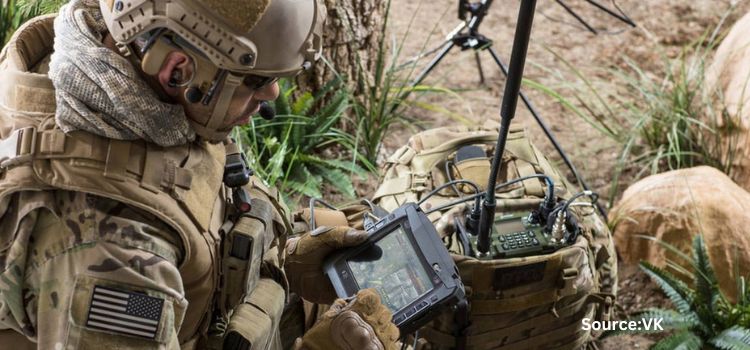
Defense Tactical Radio Market by Type (Handheld/Portable and Vehicle Mounted), by Platform Type (Ground-based, Naval-based, and Airborne), and by Application (Special Operation Force (SOF), Army, Navy, and Air force) – Global Opportunity Analysis and Industry Forecast, 2025 – 2030
Industry: ICT & Media | Publish Date: 17-Feb-2025 | No of Pages: 304 | No. of Tables: 235 | No. of Figures: 180 | Format: PDF | Report Code : IC21
US Tariff Impact on Defense Tactical Radio Market
Trump Tariffs Are Reshaping Global Business
Market Overview
The Defense Tactical Radio Market size was valued at USD 16.48 billion in 2024, and is predicted to reach USD 32.88 billion by 2030, with a CAGR of 12.2% from 2025 to 2030.
The defense tactical radio industry is pivotal in modern military operations, facilitating secure, reliable, and interoperable voice and data communication among military units, command centers, and coalition partners worldwide. These advanced radio systems, evolving from traditional analog radio to sophisticated software-defined radio (SDRs) and network-centric communication platforms, are equipped with features such as secure encryption, frequency agility, and ruggedness to adapt to dynamic battlefield conditions.
A diverse range of stakeholders, including defense contractors, electronics manufacturers, and government agencies collaborate to innovate and deliver cutting-edge radio solutions that enhance military effectiveness across land, sea, and air domains. As defense agencies prioritize communication capabilities as a strategic enabler of military superiority, the demand for advanced defense tactical radio is expected to drive growth and innovation in the global defense communication market. Amidst emerging threats and technological advancements, the industry continues to evolve, playing a vital role in ensuring the success and safety of military operations by providing essential communication infrastructure.
Rising Defense Budget by the Government Agencies is Fueling the Market
The growing government military budget has a substantial influence on the demand for the defense tactical radio industry. Developed and developing countries are extensively emphasizing on enhancing their military capabilities to stay competitive in a climate of rising tensions. According to the Stockholm International Peace Research Institute, the world military expenditure reached a record high of USD 2240 billion in 2022, representing a 3.7% increase in real terms and a 19% rise over the decade from 2013-2022. Increasing military spending allows defense agencies to allocate more resources towards the procurement of advanced communication systems, including tactical radio.
This heightened investment creates a significant demand for defense tactical radio as defense agencies prioritize upgrading their communication infrastructure to enhance operational capabilities and maintain strategic superiority. Consequently, the defense tactical radio industry experiences a surge in demand for its products and services, driving the defense tactical radio market growth and innovation within the sector.
Growing Geopolitical Tensions Across the Globe Boost Defense Tactical Radio Industry
The escalating geopolitical tensions such as, Russia-Ukraine war and Israeli–Palestinian conflict frequently drive increased in the procurement of military equipment, leading to a rise in defense tactical radio market demand for defense tactical radio.
As per the U.S. Department of Defense, the U.S. pledged radio and communications equipment valued at USD 1.01 billion to Ukraine between April 2022 and 2023. These radio systems are integral to military communication networks, ensuring secure voice and data transmission in diverse operational environments.
Equipped with advanced features such as encryption and interoperability, they enhance military effectiveness and situational awareness. As the industry evolves to meet demand, superior performance, reliability, and interoperability remain key priorities for defense agencies worldwide.
Stringent Regulatory Compliance in Defense Tactical Radio Restraint the Market
Regulatory requirements in the defense tactical radio industry introduced stringent standards for security, encryption, and interoperability in the design, production, and distribution processes. Compliance with these regulations necessitates extensive testing, certification, and documentation, increasing the complexity and costs of product development. Manufacturers must invest in specialized expertise and resources to ensure adherence to regulatory frameworks, which can include international standards such as NATO STANAGs and national security protocols, further amplifying the challenges and expenses involved.
Integration of Advanced Technologies Creates Ample Opportunities in Defense Tactical Radio Market
The introduction of Software-Defined Radio (SDRs) is at the forefront of innovation in the defense tactical radio industry. These radio systems offer unparalleled flexibility and adaptability by enabling the reconfiguration of radio functions through software updates. This dynamic feature allows for seamless interoperability and compatibility with evolving communication standards, ensuring that defense forces can effectively communicate across diverse platforms and environments.
As an example, in 2024, the U.S. Marine Corps announced to upgrade 50,000 radio with new software-defined models, enhancing capabilities and resilience against threats, with 4,000 platforms already fielded since October 2023. SDRs empower military units to swiftly adapt to changing operational requirements, enhancing their agility and responsiveness on the battlefield. Moreover, SDRs reduce the need for hardware upgrades, leading to cost savings and simplifying logistics for defense agencies tasked with maintaining complex communication networks.
North America is Projected to Dominate the Defense Tactical Radio Industry
North America holds the predominant defense tactical radio market share. This is attributed to the significant presence of countries such as the U.S. that has the world’s highest military budget, directly impacts the defense tactical radio industry. With substantial defense expenditures, these nations drive demand for advanced communication technologies, including tactical radio, to bolster their military capabilities. According to the U.S. Department of Defense, the U.S. government presented Congress with a proposed Fiscal Year (FY) 2025 budget request of USD 849.8 billion for the Department of Defense (DoD) on March 11, 2024.
Moreover, the presence of prominent defense technology companies, including L3Harris Technologies, Raytheon Technologies Corporation, and General Dynamics Corporation in North America contributes significantly to the growth and advancement of the defense tactical radio industry, driving innovation, fulfilling government contracts, and maintaining technological leadership on a global scale.
For instance, in January 2024, L3Harris secures USD 479 million USSOCOM contract for next-gen tactical radio, reinforcing their pivotal role in modern military operations. This seven-year deal includes support services and underscores L3Harris's commitment to supplying cutting-edge communication solutions to defense forces.
Asia-Pacific to Witness Significant Growth in the Defense Tactical Radio Market
Asia-Pacific is poised to witness the most rapid growth during the forecast period, fueled by the growing emphasis on indigenous innovation and technology adoption within the defense sector, positioning with region’s self-dependent initiatives. In 2023, the Indian Army procured a 'Tactical LAN Radio' under the Innovations for Defence Excellence (iDEX) initiative, promoting 'Make in India.' Developed by M/s Astrome Tech Pvt Ltd, Bangalore, the radio ensures secure, high-bandwidth communication in remote areas with features such as frequency hopping and uninterrupted 48-hour operation.
In addition, the increasing investments for enhancing military readiness and capabilities by the regional countries to modernize its defense, is increasing the demand for advanced communication solutions, driving growth opportunities for manufacturers and suppliers in the defense tactical radio industry.
As an example, China announced to boost its defense budget by 7.2% in 2024 during the second annual session of the 14th National People’s Congress on March 5. This increase reflects a consistent trend of annual growth in military spending, outpacing economic expansion. The planned expenditure for 2024 is part of China's ongoing efforts to modernize its military capabilities, aligning with China’s goal of achieving military development by 2027 and military modernization by 2035.
Competitive Landscape
Various key players operating in the defense tactical radio industry include L3Harris Technologies, Thales Group, Raytheon Technologies Corporation, BAE Systems plc, General Dynamics Corporation, Leonardo S.p.A., Elbit Systems Ltd., Northrop Grumman Corporation, Rohde & Schwarz GmbH & Co. KG, Saab AB, Lockheed Martin Corporation, Barrett Communications, Cobham plc, Codan Limited, and Rohde & Schwarz among others. These companies are adopting strategies such as product launches across various regions to maintain their dominance in market.
For instance, in November 2023, Elbit Systems announced to deliver its 600,000th operational tactical radio, solidifying its position as a leading provider of advanced communication solutions in the global market. The company's radio is renowned for their secure and reliable features, meeting the demands of modern military operations. This milestone underscores Elbit Systems' commitment to innovation and excellence in military communication.
Moreover, in October 2023, L3Harris Technologies introduced a "Smart Manufacturing Cell" (SMC) at its Rochester, NY site to bolster tactical radio production. Launched in 2023, the SMC enhances efficiency by eliminating manual barcode scanning and consolidating materials upfront. This innovation ensures superior process metrics and product quality, aligning with L3Harris's technology-driven production strategies.
Defense Tactical Radio Market Key Segments
By Type
-
Handheld/Portable
-
Vehicle Mounted
By Platform Type
-
Ground-based
-
Naval-based
-
Airborne
By Application
-
Special Operation Force (SOF)
-
Army
-
Navy
-
Air force
By Region
-
North America
-
The U.S.
-
Canada
-
Mexico
-
-
Europe
-
The UK
-
Germany
-
France
-
Italy
-
Spain
-
Denmark
-
Finland
-
Netherlands
-
Norway
-
Russia
-
Sweden
-
Rest of Europe
-
-
Asia-Pacific
-
China
-
Japan
-
India
-
South Korea
-
Australia
-
Indonesia
-
Singapore
-
Taiwan
-
Thailand
-
Rest of Asia-Pacific
-
-
Rest of World (RoW)
-
Latin America
-
Middle East
-
Africa
-
Key Players
-
L3Harris Technologies
-
Thales Group
-
Raytheon Technologies Corporation
-
BAE Systems plc
-
General Dynamics Corporation
-
Leonardo S.p.A.
-
Elbit Systems Ltd.
-
Northrop Grumman Corporation
-
Rohde & Schwarz GmbH & Co. KG
-
Saab AB
-
Lockheed Martin Corporation
-
Barrett Communications
-
Cobham plc
-
Codan Limited
-
Rohde & Schwarz
REPORT SCOPE AND SEGMENTATION:
|
Parameters |
Details |
|
Market Size in 2024 |
USD 16.48 Billion |
|
Revenue Forecast in 2030 |
USD 32.88 Billion |
|
Growth Rate |
CAGR of 12.2% from 2025 to 2030 |
|
Analysis Period |
2024–2030 |
|
Base Year Considered |
2024 |
|
Forecast Period |
2025–2030 |
|
Market Size Estimation |
Billion (USD) |
|
Growth Factors |
|
|
Countries Covered |
28 |
|
Companies Profiled |
15 |
|
Market Share |
Available for 10 companies |
|
Customization Scope |
Free customization (equivalent to up to 80 working hours of analysts) after purchase. Addition or alteration to country, regional, and segment scope. |
|
Pricing and Purchase Options |
Avail customized purchase options to meet your exact research needs. |

















 Speak to Our Analyst
Speak to Our Analyst



















